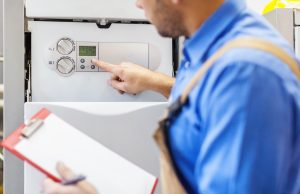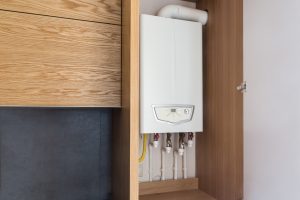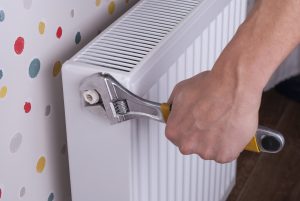It’s a truth universally acknowledged that warm tenants make for happy tenants. What’s more, landlords have a legal responsibility under the 1985 Tenancy Act “to keep in repair and proper working order the installations in the dwelling-house for space heating and heating water.”
Over the past 18 years, we have worked alongside many landlords to help them ensure their property is up to code and in fit working condition for their tenants. With the knowledge we have gleaned over the years, we have put together this article of advice for landlords concerning their plumbing and heating. The more care and attention is given to these areas of your rented property, the more likely you are to keep your tenants happy during their tenancy.

What are the landlord’s responsibilities?
When it comes to boilers, heating, and hot water, it isn’t always easy to know who’s responsible for what. Landlords may be responsible for ensuring that the heating is is good working order, but who’s responsible for bleeding radiators?
Landlords are responsible for making sure that the boiler in the property is serviced on an annual basis. You are also responsible for making sure that the person you get to do the servicing has the proper qualifications and certification. With Sean Brown Plumbing and Heating you can be assured that we have all the qualifications and certifications necessary to undertake these services.
We will always provide you with a safety certificate to record the appliances we tested, the assessment’s results, highlights of any issues that we believe require reparations, and our full contact and business details for you to keep on file.

What are the tenant’s responsibilities?
While, as a landlord, it is your responsibility to make sure that the boiler is in good working order, the tenant is responsible for using it in the right way and reporting any faults or issues quickly.
This includes making sure that the property maintains a minimum temperature of 12°C – 15°C in order to prevent the pipes from bursting. Simple maintenance like re-pressuring the boiler is also the tenant’s responsibility, and any issues that are caused by intentional or accidental misuse of the boiler are the fault of the tenant.

So what about bleeding radiators?
Whilst the landlord is responsible for making sure that the radiators are bled at the start of the tenancy, tenants are responsible for bleeding radiators during their tenancy.
However, draining radiators can be quite a substantial task so we don’t recommend anyone trying it unless they are a professional plumbing expert. As professionals are generally required for work like this, it is the landlord’s responsibility to contact and arrange maintenance calls with plumbers such as ourselves.

Final thoughts.
When you’re a landlord, it is vital that you know the rules to play by. Understanding where your responsibilities start and end is a good way to make sure that you’re doing everything you should be doing to ensure your tenant’s health and comfort.
However, it is also important to make sure that your interpretation of the rules is reflected in your tenancy agreement. Without this, your legal footing in the event of a dispute will be seriously undermined.
At Sean Brown Plumbing and Heating, we are members of Gas Safe, Oftec, ECC, and MCS for renewables, making us the best plumbing and heating choice for landlords. Contact us today.

